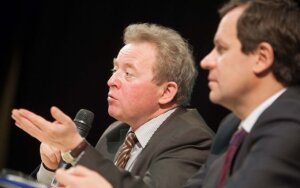- December 4, 2012
- 505
Tomaszewski: We set the tone for the EU agricultural policy

The European Union is positive, because it is an example of voluntary integration and solidarity, but also has some drawbacks. Which are is especially visible in the area of agricultural policy, as reported by the participants of the conference of Alliance of The European Conservatives and Reformists ‘The Common Agricultural Policy of the European Union – opportunities and threats’, which has begun today in Vilnius.
‘We do not brag, however, we set the tone for the agricultural policy. Perhaps, we are more confident in the Vilnius region. Perhaps it is for the divine providence’- says, at a press conference, Waldemar Tomaszewski member of the European Parliament and the leader of the Electoral Action of Poles in Lithuania. According to Tomaszewski, politicians from the countries of the East-Central Europe did not care sufficiently for the agricultural subsidies for their countries. Tomaszewski highlights, that the agricultural policy, is one of the priorities of the Electoral Action of Poles in Lithuania. The meeting of the European Conservatives and Reformists in 2011 in Vilnius was devoted to two issues, the rights of national minorities, and agricultural policy. During the meeting, the project Vilnius Declaration dedicated to the EU Common Agricultural Policy after 2013 was discussed.
Three types of safety
Vice-President of the Agricultural Commission of the European Parliament Janusz Wojciechowski concurs with Tomaszewski, adding that our states lack of determination in the fight for the agricultural subsidies. Wojciechowski says there are three types of safety, which we have to pay for: physical (military, police), energy, and food. ‘The food safety is, in fact, the most important’- argues Wojciechowski. A good example, according to the Vice-President, is Greece, which at first created the problems itself, but currently ‘can get out as much as possible’. This kind of ‘Greek’ firmness our countries lack.
Lack of Solidarity
European Union from the very beginning was motivated by the idea of solidarity. Agricultural Policy lacks this kind of solidarity. ‘There is no reason for the subsidies for farmers to be smaller. The idea of solidarity is that the rich share with the poorer. In agriculture, we encounter the opposite situation, as the rich get more’- says Wojciechowski. According to the project of the European Commission, Lithuania will be placed at one of the last places in regard to agricultural subsidies. Right behind are Romania, Latvia and Estonia. Poland occupies a slightly better position. This kind of policy may lead to the destruction of agriculture, states Wojciechowski. ‘In Belgium, or France one does not see the wasteland. It’s because of the bigger subsidies, which reduce the amount of the wasteland (…) I’m afraid of agriculture in Lithuania, I’m afraid of agriculture in Poland’ – emphasizes Janusz Wojciechowski. The conference will last two days from 4 to 5 December in the Polish House in Vilnius. Today at the conference, the papers were read by self-government and government activists responsible for agricultural policy. The President of the Lithuanian Chamber of Agriculture Andrejus Stančikas read a paper on ‘The Common Agricultural Policy from the point of view of the Chamber of Agriculture’, a paper by the secretary of the Vilnius district municipality Renata Cytacka on re-privatization of land, a paper by the mayor of Šalčininkai district municipality called ‘The Common Agricultural Policy from the perspective of local government.’ The special guest at the conference is the Vice-President of the Agricultural Commission of the European Parliament Janusz Wojciechowski, who gave a lecture on ‘The Common Agricultural Policy of the European Union – opportunities and threats’.
Tłumaczenie Jacek Malatyński w ramach praktyk w Europejskiej Fundacji Praw Człowieka, www.efhr.eu. Translated by Jacek Malatyński the framework of a traineeship programme of the European Foundation of Human Rights, www.efhr.eu.

